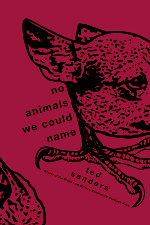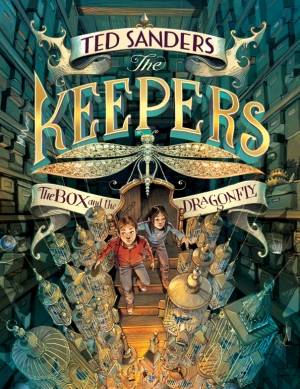This coming spring will see the release of The Box and the Dragonfly from HarperCollins Children’s Books, the first novel in a series entitled The Keepers by local writer Ted Sanders. While the series is targeted toward younger audiences, Sanders classifies his books as middle grade as opposed to young adult. “Hunger Games and The Fault in Our Stars are young adult,” he said. “My series is middle grade, with crossover appeal—which means hopefully adults will want to read it too, like they did with Harry Potter.”
 On further describing the difference between the age ranges, he said, “There’s no hard line, but middle grade is generally considered to be for 8- to 12-year-olds, though it often skews older. Harry Potter, for example, is middle grade fiction. Young adult fiction, on the other hand, is generally labeled at 12 and up, sometimes 14 and up. It tends to have more romance, even sex, possibly more violence or drug use — you know, teen stuff.”
On further describing the difference between the age ranges, he said, “There’s no hard line, but middle grade is generally considered to be for 8- to 12-year-olds, though it often skews older. Harry Potter, for example, is middle grade fiction. Young adult fiction, on the other hand, is generally labeled at 12 and up, sometimes 14 and up. It tends to have more romance, even sex, possibly more violence or drug use — you know, teen stuff.”
“In [The Keepers], the kids encounter and bond to these various mysterious artifacts that grant them different powers. I had the idea for the artifact at the center of the story — the box in The Box and the Dragonfly — several years ago,” Sanders said. He mapped out the idea for the series in a period of “manic inspiration,” during which he created characters and came up with ideas for other artifacts.
Sanders, who teaches writing classes at the University of Illinois, has spent an average of 20 to 70 hours per week on The Keepers — unless he’s in what he calls a “purposeful lull.” He began work on the series even before the release of his first book, No Animals We Could Name, a collection of short stories. “It has a lot of range,” he said, referring to the collection. “I don’t like to do the same things over and over again. I’m proud of that, but I think maybe it hurt the book a little bit because all the variety meant that it was hard to find somebody who loved it all. I remember one reviewer, in reference to my style, said, ‘Call it the new autism.’ I thought that was nice.”
 The stories come from what Sanders describes as a “pretty tumultuous several years of fierce and dangerously flaming romance,” and The Keepers is a welcome change from dealing with more heavy-handed subject matter. “It’s way better,” he said in regards to writing for a younger audience. “It’s more fun. I’m better at it, I think. For the record, it’s not easier — or at least, I’m not finding it easier.” He had a hard time pinning down the exact differences between writing literary and middle grade fiction, but said, “There’s a different sense of ownership and love. I love The Keepers — genuinely am infatuated with the characters and the story and everything. The literary stuff feels like tinkering with a machine, while the middle grade stuff feels like sinking my hands into rich dirt. But I don’t know — part of that may be because I’m writing novels now as opposed to short stories.”
The stories come from what Sanders describes as a “pretty tumultuous several years of fierce and dangerously flaming romance,” and The Keepers is a welcome change from dealing with more heavy-handed subject matter. “It’s way better,” he said in regards to writing for a younger audience. “It’s more fun. I’m better at it, I think. For the record, it’s not easier — or at least, I’m not finding it easier.” He had a hard time pinning down the exact differences between writing literary and middle grade fiction, but said, “There’s a different sense of ownership and love. I love The Keepers — genuinely am infatuated with the characters and the story and everything. The literary stuff feels like tinkering with a machine, while the middle grade stuff feels like sinking my hands into rich dirt. But I don’t know — part of that may be because I’m writing novels now as opposed to short stories.”
Sanders has written throughout his life; in fact, he claims to have written fifteen-page stories in third grade. It has only been more recently that what he simply enjoyed doing as a kid turned into a realistic goal. “Adults in my life were encouraging, sometimes giddily complimentary, but I figured they didn’t know what they were talking about,” he said. It wasn’t until he returned to school at Parkland (“I flunked out of college a couple of times, then spent my twenties just living and holding down minimum wage jobs and having marriage adventures”) that a desire to write fiction was instilled in him:
“I had a creative writing instructor who did the best thing anyone could have done for me — I turned in my very first story, and he told me it sucked. Which it didn’t at all, in the context of college creative writing classes… except that he was totally right. It sucked. And no one had ever said that to me before. So I wrote a better story, much better, and he said so. And then he basically told me I’d be wasting my time if I did anything else but this.”
 Sanders went on to transfer to the U of I and continue through their MFA program. He now teaches here at U of I and said that his teaching does not necessarily have an influence on his writing. “I think it’s more that my writing influences my teaching, in that I try to instill in my students a sense of rigor and stubbornness and self-criticism that’s necessary to become a good writer,” he said. “Younger writers tend not to fully understand how much work goes into writing, how many hours and weeks and even years of sustained obsession are required to make something good.”
Sanders went on to transfer to the U of I and continue through their MFA program. He now teaches here at U of I and said that his teaching does not necessarily have an influence on his writing. “I think it’s more that my writing influences my teaching, in that I try to instill in my students a sense of rigor and stubbornness and self-criticism that’s necessary to become a good writer,” he said. “Younger writers tend not to fully understand how much work goes into writing, how many hours and weeks and even years of sustained obsession are required to make something good.”
On that note, the time estimate it has taken Sanders to work on the The Keepers is considerable. “As someone who used to punch clocks a lot, I reckon I’ve committed something like 6,000 to 8,000 hours to the series in the last four years.”
Sanders’ goal is for The Keepers is to tell a good story. “I want the characters to be loved,” he said. “I also wanted to write a book for and about kids in which adults play meaningful roles. The adults here aren’t just hovering mentors, I hope, but complicated actors. I hope these are books adults will want to read. The books strive to be smart. They are undeniably smart, actually, but not oppressively so.”
With the release of The Box and the Dragonfly coming March 3, Sanders is taking the semester off from teaching and is anticipating a tour for the book’s release, though nothing has been set in stone yet. The plan is to release four books, although the series could surpass that length. “It could easily be longer, if there’s a readership out there.”
Sanders would like to continue teaching in town, but that will be determined by the success of The Keepers. “If the books do well the teaching may have to end,” he said. But if he had to leave his students to devote more time to writing, he would leave them with this piece of advice: “Go live your life. Watch and listen. Feel and do. When you write, fear no one.”
Photo of Ted Sanders by Lillian-Yvonne Bertram. Cover photo by Matt Minicucci from Smile Politely archive.








